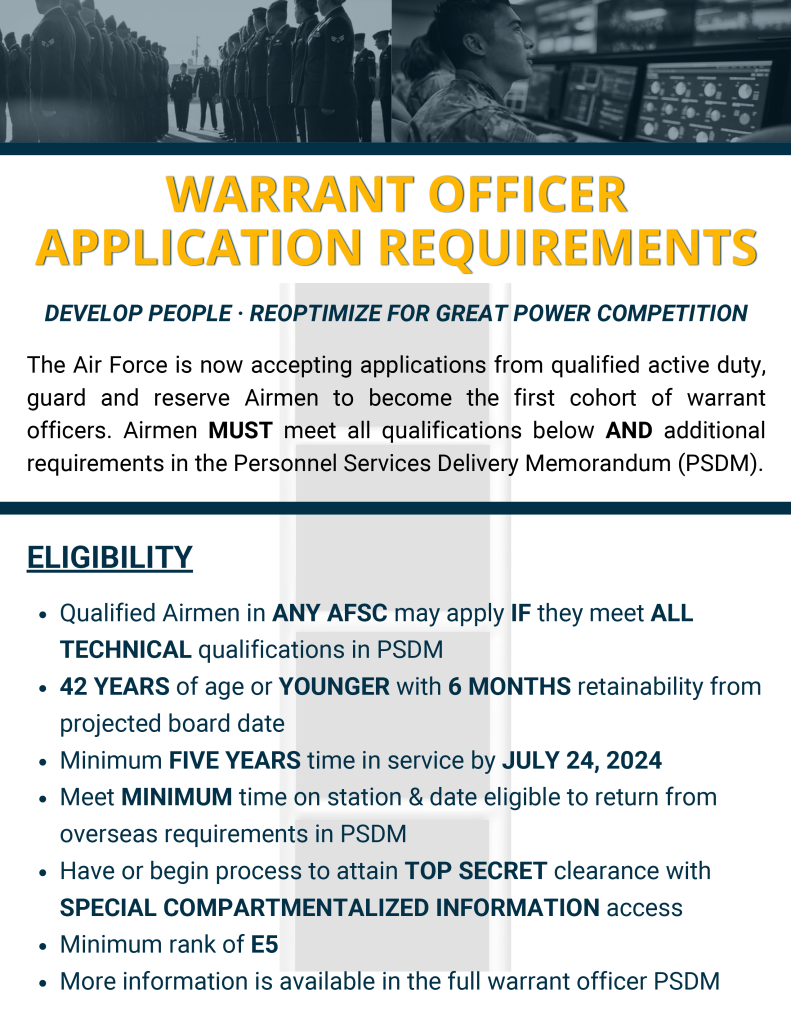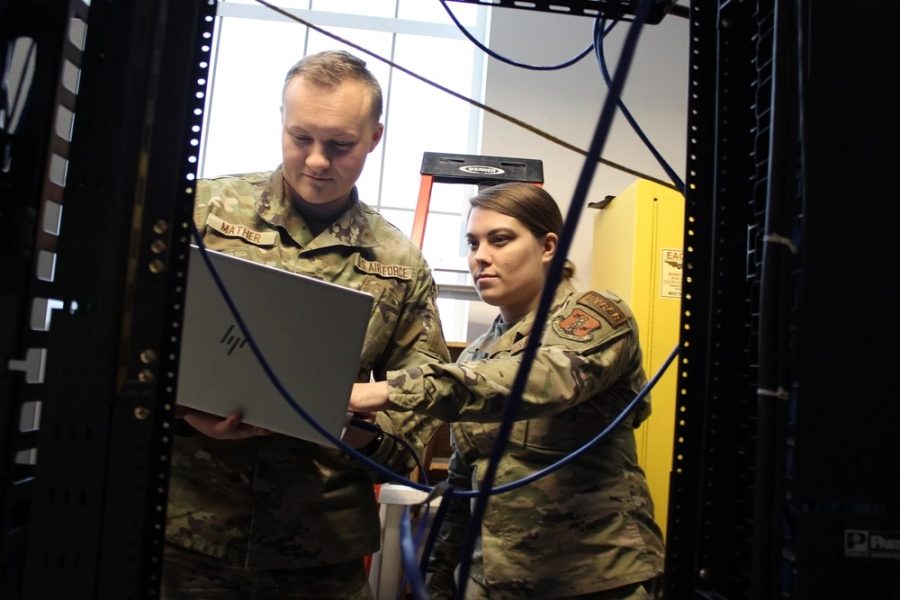Airmen can apply to become warrant officers in cybersecurity or information technology starting today, April 25, through May 31, the Air Force announced. From June 24-28, a selection board will pick up to 60 candidates for the eight-week Warrant Officer Training School (WOTS) at Maxwell Air Force Base, Ala. Selectees will be notified in late July, with an initial class scheduled to start in the fall of 2024 and a second class in early 2025.
The graduates will be the first batch of new Air Force warrant officers since 1958, when the service dissolved those ranks in favor of creating senior master sergeants and chief master sergeants. The Air Force and Space Force are the only military services currently without warrant officers, who fill technical rather than leadership functions in the other military branches. Now the Air Force wants to bring them back to maintain expertise in fast-moving technical fields such as IT and cybersecurity.
“With perishable skills, like cyber, like IT, where the technology is moving so rapidly, folks who are experts in that can’t afford to be sent off to a leadership course for eight or nine months,” Alex Wagner, assistant secretary of the Air Force for manpower and reserve affairs, said April 9.
Time spent in mandatory leadership roles can also hurt retention; Air Force Secretary Frank Kendall said in February that about 100 Airmen joined other branches in recent years so that they could become warrant officers in IT and cyber. Airmen have been enthusiastic about the new program since it was announced in February.
“Everything we’ve discussed about warrant officers in our shop so far has been positive,” one anonymous cyber Airman told Air & Space Forces Magazine.
The April 25 announcement laid out new details for what kinds of candidates could apply. The program is open to members of the Active Duty, Air National Guard, and Air Force Reserve, but candidates must hold the rank of at least staff sergeant and have one year of active federal service. While Airmen from any specialty code can apply, they “must meet specific functional technical experience,” the release noted.
For IT, that includes at least “24 months of documented operational experience with enterprise IT or warfighter communications systems in areas such as voice and data internetworking, local and wide area networks, including terrestrial, satellite, and aerial systems, as well as network planning,” the release said. Applicants must also hold a Defense Department-approved industry certification commensurate with the requirements for the Information Assurance Technical Level II certification or higher.
On the cyber side, candidates “must hold senior level proficiency in one or more U.S. Cyber Command work roles as defined in the Commands Job Qualification System, or National Security Agency equivalent,” the release said. Candidates interested in a cyber capability developer work role must also “be a certified U.S. Cyber Command Senior Cyberspace Capability Developer or a Computer Network Operations Development Program graduate or have three years of experience in system level programming, i.e. C, Assembly.”

Candidates can apply through the personnel management website myFSS, where they must submit evaluations and letters of recommendation. An Air Force official told reporters on background that a key component of the application will be a technical letter, which explains to the board “why is this member a no-kidding technical subject matter expert?”
“This board is going to be highly competitive,” the official said. “These have to be the right 60.”
There are five warrant officer ranks on the Defense Department pay scale, and the exact breakdown of what graduates’ ranks is still under consideration, officials said, but they are all supposed to be authoritative in their field.
“Having personally worked with warrant officers in the past, they’re usually the guys or the gals that we go to for the ‘no kidding’ answer on what’s happening, because they have that level of expertise,” an official said.
Indeed, documents shared on Reddit on April 24 break down the exact roles and responsibilities for the two new Air Force specialty codes: 17W for warfighter communications and IT systems operations; and 17Y, for cyber effects and warfare operations. 17Ws are experts and advisors for planning, deploying, using, and securing communications systems, while 17Ys perform the same role for offensive and defensive cyber operations, assets, and personnel.
Air Force spokesperson Master Sgt. Deana Heitzman confirmed the documents were from the Air Force Officer Classification Directory, which contains the official specialty descriptions for all military classification codes and identifiers.
The rank insignias for the new warrant officers will look similar to those used by their Army counterparts, and the pay will be the same indicated on the Defense Department pay scale. But where the warrant officers are assigned after graduating could vary depending on operational requirements, the Air Force said in its announcement.
Officials said they “definitely” will stand up additional cohorts after this one, but when those cohorts happen and how many warrant officers will be trained is still under consideration. Likewise, the exact breakdown of IT and cyber warrant officers in this upcoming class is also to be determined based on the applications the selection board receives.
No matter how it breaks down, the reintroduction of warrant officers is a major change to the way the Air Force has done business over the past 60 years. Officials told reporters that once the graduates’ assignments are determined, there will be training and webinars with the command teams at those units to make sure leaders know how to work with warrant officers and know their authority and responsibility. Officials are also taking lessons learned from the Army, Navy, and Marine Corps’ warrant officer experience.
“I’m excited to see what comes out of it,” an official said. “We’ll have to adapt a lot, I’m sure, but the overall goal, what we need to hit right, is that culture.”
Whether the Air Force might expand warrant officers beyond cyber and IT is yet to be seen, as the service first wants to see how these initial experiments go. But Kendall has expressed interest in expanding the scope.
“I expect ultimately, assuming that we’re successful with these initial steps, that we’ll probably expand it,” he said March 5. “I don’t think it’s going to happen immediately, so you shouldn’t hold your breath about this. But my sense is, my own intuition about this, is that we’re going to want to expand it after we see how effective it is for cyber and IT.”
